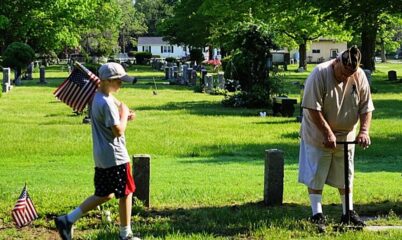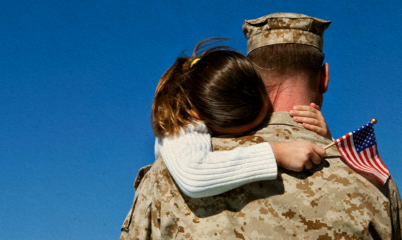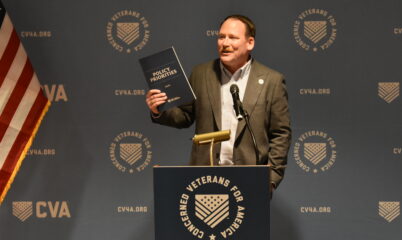
My VA Story: Air Force veteran felt abandoned by the VA in his final days
For some veterans, the Department of Veterans Affairs provides excellent medical care. For others, the care is terrible.
And for some, experience moves from one end of the spectrum to the other.
For more than 30 years, Air Force veteran Bob Bowser never had a problem with the VA. But in his final year of life, amid rapidly deteriorating health, his experiences with the VA dramatically changed.
Bob’s wife Judy shared his VA story from her perspective as his spouse and caregiver.
A ‘brilliant man’ that chose to serve
Bob knew he wanted to serve his country from a young age.
“His mother had to sign for him,” shared wife Judy about Bob’s enlistment. “He was 17 when he joined the Air Force in 1963. He wanted to choose his path before getting drafted.”
After basic training, Bob was asked what he wanted to do in the Air Force. He turned the question around and asked what there was a need for. The Air Force needed weapons specialists, so after training, Bob was off to Germany working on thermonuclear weapons.
“He was a brilliant man, really brilliant” Judy said.
Bob and Judy met by chance in 1991. Judy was a nurse in a gastroenterologist’s office and Bob was called in to fix her office’s x-ray equipment. “A few months later, we started going out together,” Judy remembers. They were together ever since.
Judy would be by Bob’s side for the next 30 years, through all of life’s ups and downs, and would eventually become his full-time caregiver.
VA care went from great to terrible
Bob used the VA for his medical care for 35 years with no issues.
“He bragged about what a great system it was,” Judy recalled.
But Judy noted that around 2015, the quality of care started to slip. Bob tore a muscle in his shoulder and was given the runaround from VA schedulers and staffers to fix the problems. “He was basically immobile” Judy said. Months of calling the VA to check in when an MRI would be scheduled, only for Bob to be sent to physical therapy before testing was done. It took a physical therapist getting involved to ensure an MRI was done and orthopedist appointment was scheduled.
That experience put a bad taste in Bob and Judy’s mouths.
Care grew worse in 2020 once the COIVD-19 pandemic hit. “Any delay was blamed on COVID,” she said.
The delays continued to grow as Bob complained to leadership about the quality of care he was receiving. The wait times for call backs, appointments, and tests grew longer and longer. His medications were continually screwed up. Doctors cycled in and out of the VA, leaving Bob feeling he’d lost continuity of care.
He was souring on his VA care more, but didn’t have any other health insurance, so VA was his only option.
In 2022, Bob’s health took a serious turn, and wasn’t made better by the VA’s treatment. After a few days of sudden nausea, Bob started to exhibit stroke-like symptoms. He was taken to the closest VA emergency room where the doctors believed he had experienced a mini-stroke. They needed an MRI to confirm the diagnosis, but the closest VA with an MRI machine was in Gainesville, and those doctors said his symptoms sounded more like a cardiac problem.
Bob was sent home with a heart monitor.
Symptoms returned over the next few days, and being a retired nurse, Judy knew she had to get him back into the hospital. Soon, Bob was taken to Gainesville for the MRI, then to a community provider at University of Florida Health, where he and Judy found out it was worse than a stroke – Bob had an inoperable brain tumor.
‘The VA washed their hands of him’
Bob and Judy had a home in Pennsylvania that would be better for Bob’s recovery, so the two packed up the car and headed north with plans for Bob to receive chemotherapy and radiation, in hopes of shrinking his tumor to give him some better quality of life.
Bob met with an oncologist through University of Pittsburgh Medical Center, an appointment that was managed via the VA’s community care program. The plan was to start chemotherapy immediately as the tumor was growing at a rapid rate.
What Bob and Judy needed at this point was a compassionate VA to walk alongside them through the process. What they got was a cold VA system that caused mental and emotional hardship.
Their case manager did more to frustrate them than to help.
“Bob was upset and the case manager was telling him to just relax and think good thoughts,” Judy recalls. The case manager left the Bowsers feeling hopeless and frustrated.
As Bob continued treatment, the tumor continued to grow. Soon it was clear to the doctors that nothing else could be done. Bob was put on hospice care and taken home.
“It seemed like VA washed their hands of him once he was on hospice care,” Judy said “His case manager stopped returning calls, even though she had told us to call her for whatever we needed.”
Any medications not covered by hospice needed to come from the VA, but the VA wouldn’t supply them as Bob was no longer under VA’s care, despite a long history of other conditions that required medications VA had previously provided.
Bob’s last weeks were spent in frustration that the VA had abandoned him.
Last days spent feeling abandoned
Bob’s Medicare benefits covered a nurse coming to the house two hours a week, but the rest of Bob’s care was up to Judy. She was managing all his physical care while the tumor was causing Bob’s memory to fail.
“It was just me. I was the only caregiver 24 hours a day,” Judy said. “He was walking and talking for 24 hours a day, so I had to lock the doors and put up baby gates. He was still able to get out and our security system woke me up. The next day I had to get him into a memory care unit. The VA did pay for that.”
Bob stopped eating and being responsive, so Judy brought him home. Soon after coming home, Bob passed away, with his faithful wife turned caregiver by his side.
When Judy looks back on Bob’s illness and final days, she feels abandoned by the VA too. “I tried to get some help,” she recalls, “but I got no phone calls back.”
The VA failed Bob Bowser in how it treated him at the end of his life. It failed Judy in causing her undue stress when she should have been solely focused on caring for her husband.
They both deserved better.
Read more veteran and spouses stories at My VA Story.




